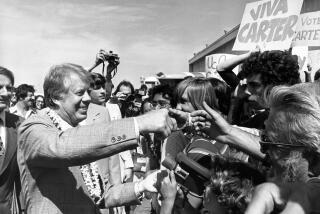COLUMN RIGHT/ TOM BETHELL : Clinton Falls Fast for the Beltway Trap : His ‘economic stimulus’ will only stimulate big government at the middle class’ expense.
- Share via
In the 1992 campaign, it was frequently said that divided government was the underlying political problem. But President Clinton has already found that party affiliation is among the less important distinctions in the capital. The real political fault lines separate a Capitol Hill jealous of its prerogatives, and a White House eager to pursue its agenda. Perhaps more important, they separate the rulers and the ruled: the permanent, unelected government inside the Washington Beltway and the great middle class that must pay the government’s bills in the form of ever higher taxes.
James Carville, Clinton’s campaign strategist, had it right when he said that the economy dominates all other issues. Presidents who get it wrong leave after four years. When Jimmy Carter came to Washington, he at least recognized that Middle America and the Beltway culture have divergent goals. In representing himself as the outsider from Plains, Ga., he acknowledged the threat that the permanent government poses to those who seek elected office. Soon enough, of course, he was steered into trouble by those he had instinctively distrusted. Clinton, on the other hand, has shown little sign of recognizing that the arena he has now entered is hazardous to political ambition.
Clinton’s economic plan, soon to be announced, is likely to be more popular within the Beltway than without. Those who would like to concentrate more power in Washington are well represented in the Clinton Cabinet--Budget Director Leon Panetta and his assistant Alice Rivlin come to mind. They (and others) are already steering the President in a dangerous direction.
Clinton is being advised that the middle class will put up with tax increases just as long as the rich are punished more severely with even higher taxes: that envy has mass appeal, in other words. If so, Clinton might be better advised to fire his top economic adviser, Robert E. Rubin, who reportedly earned $15 million in 1991 as co-chairman of the investment banking firm of Goldman Sachs & Co. Before leaving to go to the White House, Rubin told his clients in a letter that he looked forward “to continuing to work with you in my new capacity.” Ralph Nader, where are you now that we need you?
As it is, Clinton is planning to raise taxes on the middle class because of the budget deficit. “Deficit reduction” is one of the most confusing phrases in current discourse. Republicans were repeatedly taken in by it. Ordinary people think it means that government at last is going to be cut back. In the same way, when they heard candidate Clinton talking about being a “different kind of Democrat,” they surely assumed that he had learned from the party’s mistakes, and so would resist the expansion of the state.
This was a mistake. Taxpayers are about to learn that deficit reduction means tax increases. To be sure, Panetta & Co. are talking about cutting $2 of spending for every $1 increase in revenue, but recent experience has shown that such ideas never materialize. President Reagan signed on to a tax increase in 1982 with the promise of 3-for-1 spending cuts. As soon as the tax increase was enacted, spending cuts were transformed into increases.
In his support of an “economic stimulus package,” Clinton has already shown he is not serious about reducing spending. “Stimulus” means more government spending, in case you wondered. If the budget deficit is really such a great problem, it makes as much sense to prescribe more spending as it would for a doctor to prescribe aspirin to a patient who has swallowed a bottle of aspirin.
To put it in plain language, this Administration’s economic program will consist of initial spending increases--soon to be followed by tax increases. These will be levied on the middle class, because there is no other place to capture the revenue. The change that Clinton promised is turning out to mean “spend and tax” rather than the customary “tax and spend.” Clinton’s problem is that he believes in something that does not work: big, activist government. Nonetheless, all the indications are that he is about to make it bigger. He seems to think that there is no great risk in so doing because he will bring to the task the ingredient that was so sorely missing in the Republican years--good will. He might recall that the only President in the last 32 years to serve two full terms, Ronald Reagan, also tried to constrain the growth of government. If Clinton saddles us with a package of tax increases, the economy will sag, and he, too, will be a one-term President. Maybe he should bring back Carville before it is too late.
More to Read
Get the L.A. Times Politics newsletter
Deeply reported insights into legislation, politics and policy from Sacramento, Washington and beyond. In your inbox three times per week.
You may occasionally receive promotional content from the Los Angeles Times.










